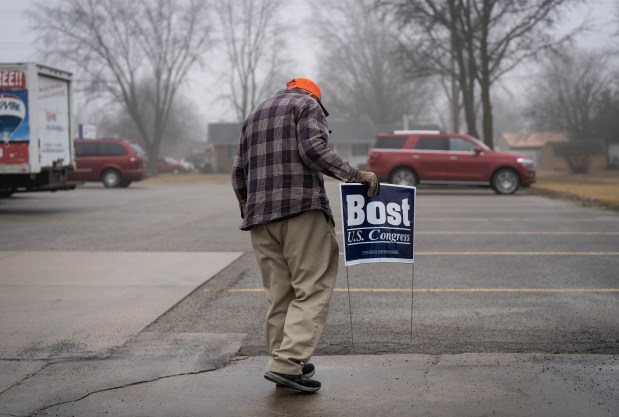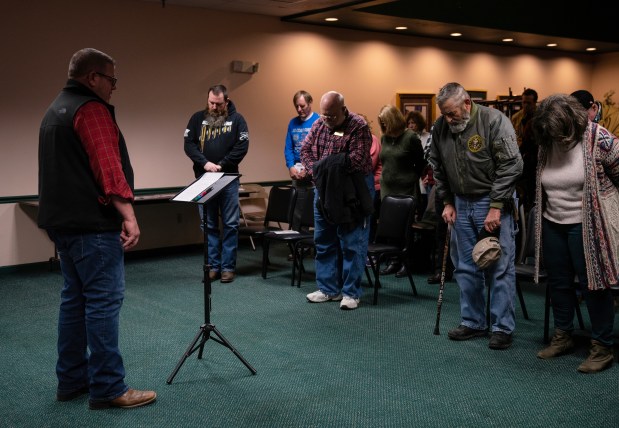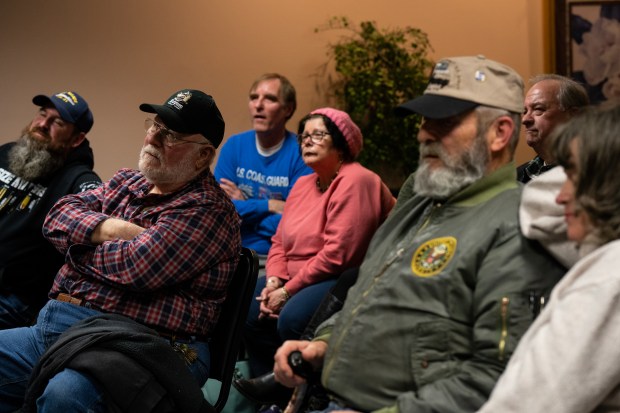MARION, Ill. — The day after former President Donald Trump endorsed his congressional opponent, a scorned Darren Bailey who had deeply coveted Trump’s backing took to Facebook to deliver another of his near-daily video devotionals to supporters.
“I am so confident of victory because I believe that you know that you’re not going to let an endorsement stand in the way of you doing the right thing — that you’re going to show up, you’re going to vote for the right person,” Bailey said of his insurgent GOP primary challenge to five-term downstate U.S. Rep. Mike Bost.
While Bailey — whose unsuccessful 2022 Republican bid for governor was embraced by Trump — had again courted the former president with frequent trips to Mar-a-Lago, he derided Trump’s endorsement of Bost as an example of how “deals are made behind closed doors.” After pledging fealty to Trump, Bailey now spun that he felt liberated and that “the blessing” of not getting the endorsement shows he’s “not beholden to anyone.”
“In a way, I felt a sense of relief that I will be able to stand up, stand firmly, confidently, resolutely,” he said. “I will stand on our principles and values” and will “not be sold out.”
In the deeply ruby red 12th Congressional District, the state’s most Republican district encompassing all or part of 34 counties in the southernmost one-third of Illinois, Trump looms large. From within its boundaries — the district was redrawn in 2022 following the U.S. census — Trump scored nearly 71% of the vote in the 2020 election over Democratic President Joe Biden.
It’s also among the most conservative districts in the nation, its ideology and culture symbolized by the soaring 198-foot-tall Cross at the Crossroads in Effingham along Interstates 57 and 70. The district stretches down to several Illinois borders, encompassing Cairo and Metropolis on the south, Waterloo, Chester and the Mississippi River on the west and Lawrenceville and Shawneetown on the east. The lone blueberry in the apple pie is Carbondale, home to Southern Illinois University.
All of which makes Bailey’s challenge to Bost more noteworthy. But the congressional race, along with other challenges from the right to elected conservatives in downstate, down-ballot legislative races, represent the evolution of Republican conservativism in Illinois and across the nation. Conservatives have moved the GOP steadily to the right, from U.S. House Speaker Newt Gingrich’s no-holds-barred leadership with the Contract with America in 1994 to the grassroots Tea Party movement to the extremes of the current hard-line House Freedom Caucus — with Trump’s influence over the GOP now serving as an accelerant.
Ryan Burge, a professor of political science at Eastern Illinois University, said he sees the primaries as “endemic of what’s going on in the Republican Party. The Republican Party’s gone rogue.”
“I think these votes are indicative of how we think about the future of America. Not to get too hyperbolic, but is the American experiment over? I think we’re really teetering on the brink of that question,” Burge said.
“If Bailey wins, I just think it’s more evidence that the American public is so pissed off about their station in life that they’d rather burn the whole thing down than stick with business as usual. And, I don’t think they fully realize the ramifications of destroying all the institutions that made America what it is. So really, that’s the referendum,” he said.
‘Ripe for the culture wars’
The contests also represent the evolution of politics in the region. Socially conservative Democrats — boosted by union coal mining jobs and manufacturing — dominated the area until the mines producing high-sulfur, high pollution coal began shutting down and globalization moved manufacturers out of the country.
Those factors became a potent cocktail for a Republican surge, stirred by the fervor of charismatic Christian evangelism in its rural churches and the politics of portraying residents as the victims of larger forces.
“It’s just all that stuff was ripe for the culture wars to overcome the economic interest,” said John Jackson, a longtime professor at SIU’s Paul Simon Public Policy Institute. “All that’s left is competition within the Republican Party.”

Bost and Bailey share the same conservative ideologies — support for gun rights, opposition to abortion and assailing Biden over immigration policy while vowing to push to close the nation’s borders.
But Bailey, 57, a farmer from Xenia and former state lawmaker, seeks to portray himself as further right than Bost. He associates himself with the Freedom Caucus and its leadership in ripping “establishment” Republicans and pursuing self-defined “common sense” policies, playing a long game backed by Trump of tearing down long-standing institutions of government.
Deinstitutionalize government? “I like that,” Bailey said after hosting a gathering of gun-rights supporters. “The normal norms and conventions, they’re simply not working. Nobody in their right mind can tell you that they are. Life has become too burdensome. Our children are at risk. Our law enforcement’s at risk. Our safety’s at risk. Things aren’t working.”
Bailey contends Bost is an example of how Republicans in Illinois and across the nation have become “watered down” in their leadership “because people with fortitude and courage are kind of stepping back and letting them.”
“I want to be part of a new breed who stands up, says, ‘This is our platform. We’re sticking with it because we have the answers.’ And then we need to be able to show the people in southern Illinois, the people in Illinois, the people in America that this works. And that hasn’t happened for a long time.”

Bost, 63, a Marine veteran from Murphysboro who is chair of the House Committee on Veterans’ Affairs, bills himself as a “governing conservative” still interested in seeking “compromise” to advance legislation despite it becoming an attack word from the far right.
“They want to be purists and not compromise and not only am I going to say compromise, but I want to say find common ground because compromise, for some reason their group wants to say, ‘You’re giving up your morals.’ I’m not giving up my morals,” Bost said of the Freedom Caucus.
Bost dismissed Bailey’s primary challenge as driven by “ego” and Bailey’s desire to align with a far-right group of lawmakers who, in ousting Kevin McCarthy from the speakership, showed they were more interested in self promotion than governance.
“It’s not about governing. It’s about getting likes on social media,” he said. “This is rough. It’s a hard time to be in government and I believe my opponent would make it worse.”
Bost said his experience in Congress has proven “vitally important” for the district, particularly as VA committee chair in getting the opportunity to know both Republicans and Democrats needing help for their constituents.
“My votes have been right. My votes have represented this district well,” Bost said. “I am a true conservative.”

SIU’s Jackson said a legislative process that “used to be about give and take and you get part of what you need” has been supplanted by a contingent in Washington, D.C., and in state legislatures backed by voters “who don’t want to hear that. They want to know that you’re just up there fighting and you’re raising Cain and you’re getting on Fox News and that’s the kind of people they want.”
In previous political times, Bost would likely be considered the more “establishment” candidate, having served about 20 years in the Illinois House until his election to Congress in 2014.
Two years earlier, he gained widespread attention when Democrats in Springfield sprung a newly written pension bill on GOP state lawmakers during the final days of session, prompting him to toss the multi-hundred page bill into the air, take a swat at the papers as they fell and rant about the power of then-Democratic Speaker Michael Madigan. He proclaimed, “I feel like somebody trying to be released from Egypt. Let my people go!”
The video went viral and even Bost concedes he thought his political future was over. “It scared me to death that I was done,” he said. Instead, it helped him get into Congress.
But Bost eschews the “establishment” label.
“They always want to use the word ‘establishment.’ I see establishment as those people out there who are just go along and get along. I’m not that,” he said.
Getting Trump’s backing
Bost had secured the endorsements of “established” political entities that matter to the district: the Illinois Farm Bureau, the National Rifle Association, the National Federation of Independent Businesses, the Illinois Fraternal Order of Police and the Associated Fire Fighters of Illinois, as well as the backing of House Speaker Mike Johnson of Louisiana.

It was Johnson, along with leading House Republicans, who met with Trump and pressed the former president to endorse Bost. Trump said that although “I like and respect” Bailey, Bost has been a stalwart supporter of his “America First” agenda.
In November, when he filed his candidacy petitions for reelection in Springfield, Bost said he would take it personally if Trump backed Bailey and at the time predicted if the former president endorsed his opponent it could hurt him politically.
“Would it bother me? It would bother me personally,” he said then. “I don’t know what it would do to the election. I mean, it can’t help (me) with that district.”
The blow to Bailey’s campaign — which uses yard signs saying Bailey “fights like Trump” — was palpable. A day after the Trump endorsement of Bost was announced, Bailey held a drawing for the winner of a 24k gold finished and engraved “Trump 45” caliber pistol that he had been toting around to campaign events as a fundraising tool.

SIU’s Jackson said the Trump factor is “unprecedented in American history” in terms of a former president holding such clout over a political party and its candidates while also actively seeking a return to the White House.
“If it was (a voter) who was wavering or somebody who was inclined toward Bailey but not absolutely a true believer, this may well have tipped over a certain percentage of what is the Trump base, the MAGA base, which is certainly strong in this area,” Jackson said, referring to Trump’s endorsement of Bost and the former president’s “Make America Great Again” slogan.
In a meeting in a converted strip mall on the outskirts of Marion, which contains offices as varied as the University of Illinois Extension Service, a Jewish congregation that features “Ask the Rabbi” events and a martial arts academy, Bailey featured gun-rights advocates Mike and Valinda Rowe of White County.
“We need somebody with their hair on fire, just marching in and getting noisy for our causes,” Mike Rowe said in encouraging a group of about 30 people to support the challenger.
The “hair on fire” metaphor is apt for Bailey, EIU’s Burge said, given the challenger’s desire to “burn down” government and its institutions regardless of the fact that government institutions and funding, ranging from hospitals to schools to farm grants, are “propping up downstate Illinois.”

But in Bailey’s view, “Every ‘yes’ vote expands government and brings in more bureaucracy and it just bloats government that then has to be fueled and fed. It’s not working.”
His opposition to earmarks stands in sharp contrast to the belief in the role of elected officials to “bring home the bacon,” like the late, flamboyant Democrat Ken Gray. Known as the “Prince of Pork,” Gray served 23 years delivering projects to the area in two stints in Congress and has a portion of I-57 named after him.
Bost supports earmarks and notes that neighboring U.S. Rep. Mary Miller of Hindsboro, a Bailey backer and Freedom Caucus member, rejects them to the chagrin of local mayors in her district.
“Any earmark, or whatever you want to call it, that I have ever asked for, I will defend it because I am talking to my people and knowing that it is supported,” the congressman said.
“If you don’t do it in your district, somebody’s going to do it in theirs. And if Mary doesn’t want what should have been her earmarks, then send them to the Illinois 12th because I’ve got other places where I’m going to be falling short and projects that need to be done so that we can grow and be the booming economy that we need to be,” he said.
Immigration ‘at the forefront’
As Republicans have recently highlighted the issue of immigration nationally — and controversy has swirled over the issue of caring for asylum-seekers being bused from the southern U.S. border by Texas Gov. Greg Abbott to Chicago — the topic “is at the forefront right now” in the district, Bost said.
“Do we see a mass pile of illegal immigrants flowing into Teutopolis? No,” Bost acknowledged. “But there’s enough communication with the media. They see their country snatched away from them by an open border.”
But Bailey has a more ominous warning for voters, claiming with no proof that tax dollars are going to be used to “take care of millions of illegal aliens right here in Illinois, the ones that are up in Chicago right now, the ones they’re getting ready to ship down in our communities right now.”

Since August 2022, according to city of Chicago numbers, more than 36,000 asylum-seekers have been shipped to the city. Asylum-seekers are not in the country illegally and there are no stated plans to ship them en masse to southern Illinois.
The two candidates’ views on immigration are one example that reflects how local voters want “a hard-nosed conservative” as their congressman, said John Shaw, director of SIU’s Paul Simon Public Policy Institute.
“Bost has doubled down on his conservative credentials while also saying that he can govern and Bailey has doubled down on his contrarian stance and has said that he’s going to be needed to shake things up,” said Shaw. “I think both messages resonate to some extent in the district.”
More than anything else, Trump’s endorsement provides Bost a shield to parry Bailey’s attacks that the congressman is too establishment, that he’s not conservative enough and that he’s been in office too long.

“What is Bailey’s messaging right now? Like, how do you message? It was, ‘I’m more conservative than him.’ Right? Bailey’s more conservative than Bost. But all Bost has to say is, ‘Donald Trump endorsed me.’ So, like, that’s the end of that debate,” Burge said.
Bost already had a significant money advantage over Bailey, who started the year with a little more than $117,000 in cash on hand to the incumbent’s nearly $1.4 million. But Bailey also was counting on the name recognition he got during the governor’s race to make up some of the difference. He got more than 1.7 million votes statewide in losing to Democratic Gov. J.B. Pritzker, and more than 70% of the vote in the congressional district.
After Bailey’s event in Marion, Mary Mullinix explained her support for the challenger. She said she supported Bailey’s efforts to fight Pritzker’s COVID-19 mitigations during Bailey’s time as a state senator in 2020. Mullinix, 63, said she lost her job as a bus driver because she would not adhere to certain pandemic restrictions.
“I would watch some Facebook posts and what (Bailey) was fighting for and telling what he did, and a lot of people thought that was over the top,” Mullinix said of Bailey. “But he’s fighting for our rights, our conservative rights to be able to stand up to, if we want to wear a mask or not.”
The next day, Bost stopped at an Illinois Farm Bureau office about 110 miles northeast in Effingham after the group endorsed his reelection. Afterward, Effingham County Board Chairman Josh Douthit said he backed Bailey’s run for governor but is supporting Bost in the congressional primary because he thinks Bost has done a good job in Washington.

While Douthit said Trump has pushed the idea that citizens have to “get a little more extreme about our views on what’s going on in government because there’s some big problems,” he doesn’t include Bost in that calculation.
“The experience speaks for itself with Mike,” Douthit said. “He’s able to navigate and see around probably some of those people that he thinks that maybe are part of the swamp.”
Trump’s endorsement of Bost has not stopped Bailey. In some respects, the challenger has begun doubling down, stepping up his insults of the incumbent as “soft handed,” as a “swamp loyalist” and “an absolute and complete sellout” as Bailey counts on help from his far-right endorsers.
Bailey’s backers include U.S. Rep. Matt Gaetz of Florida, who led the ouster of McCarthy as House speaker and who Bost lunged at during a closed-door conference over the speakership. An early March Bailey fundraiser is featuring Mike Lindell, the CEO of My Pillow, who dispensed wild and unproven conspiracy theories alleging Trump’s 2020 election was stolen.
Races also heating up for legislature
Bailey’s also counting on help from the far-right Illinois Freedom Caucus, a group of Springfield lawmakers he aligned himself with in the state legislature that has pushed separating Chicago from the rest of the state.
Challenges similar to the one Bailey is waging have been mounted against conservative members of the General Assembly by Freedom Caucus-aligned challengers.
In one race, four-term Republican state Rep. Dave Severin of Benton has received some campaign cash from unions as he tries to stave off a primary challenge from Angela Evans of Sesser. Her Facebook page describes Evans as a “Christian, wife, mother and grandma with Conservative values, she is PRO-TRUMP, PRO-LIFE, and a lifelong member of the NRA.”
On her Facebook page, she shared a video from Bailey in which he lamented that a Cook County judge on Wednesday “single-handedly” ordered Trump be removed from the March 19 GOP primary ballot. While not addressing the fact Trump endorsed his opponent, Bailey also urged people to still vote for Trump as a write-in candidate. The judge has stayed the order and Trump remains on the ballot pending appeals.

The judge “is citing the same junk that we’ve heard before. The Jan. 6th situation,” Bailey said in Vienna, Ill., where he held a campaign event. “Friends, now more than ever we must stand. We stand behind President Trump. We vote for President Trump. And we let our voices be made known.”
The judge’s ruling prompted Bailey to launch this weekend a “Stand with President Trump” rally tour of the district, even though Trump isn’t standing with Bailey in the congressional race.
In another race, Severin-ally state Sen. Terri Bryant, who has spent eight years in the General Assembly, is being challenged in the GOP primary by Wesley Kash, a farmer and lawyer from Scheller.
A representative for Kash didn’t make him available for an interview. But in January, he told Herrin radio station WJPF that he’s running against Bryant because his legal background can help him sort out all the “gobbledygook” in legislation that contains “garbage” and that “God has been working on me for a while to be a leader.”
He also said he learned about Bryant’s voting record and questioned her conservative credentials, especially because she voted in the past to raise taxes.
“I just want to keep pushing hard on a manageable budget that’s less than what we’re taking in to try to dig out the debt that we’ve accrued from all these experienced politicians just doing business as usual,” Kash said.
Kash’s campaign is being financed by more than $300,000 in family money. Bryant began the year with more than $277,000.
Bryant, a conservative Republican from Murphysboro who also served with Bailey in the House and Senate, has been attacked for voting for a tax hike during the tenure of Republican Gov. Bruce Rauner in order to end a two-year budget impasse that damaged the state’s economy and decimated state services, including funding for SIU-Carbondale.
To her constituents, Bryant defended her vote and said it was a first step to bring Illinois out of financial chaos. But she said that nuance can get lost on ultraconservative voters who distrust government institutions that are often run by Democrats.
“What is conservative to you? Conservative is you pay your bills on time. Conservative is you don’t create new debt,” she said. “We’ve dumbed everybody down so much that they don’t want to think anymore. They want everyone to spoon feed them what they’re supposed to think.”
Bryant said she found it “shocking to me and my family that someone calls me a RINO,” short for Republican in Name Only.
“The Democrats think it’s hilarious because I’m about as conservative as you can get,” she said. “I’m an evangelical who teaches an adult Sunday school class. Right? I tick all of those boxes.”

Asked why she has a primary opponent, Bryant said “somebody woke up one day and thought this job was easy.”
But it’s not just more moderate conservative GOP members in the legislature that are fighting primary challengers. Some members of the far-right Freedom Caucus have found their reelection bids under attack by other Republicans.
Central to those battles is the role of teachers unions, which have begun to fund Republicans in primary bids against Freedom Caucus incumbents. The strange turn comes after many members of the Illinois Freedom Caucus have blamed teachers unions for supporting so-called woke curricula being pushed on children and last year also called on the Illinois Republican Party to ban GOP legislative candidates from taking campaign donations from teachers unions.
But the unions are fighting back, particularly against two incumbents from the caucus — state Reps. Blaine Wilhour of Beecher City and Adam Niemerg of Dieterich — who were among Bailey’s closest allies when he was in the legislature.
The Illinois Education Association’s campaign arm has donated about $66,000 to Wilhour’s opponent, Matt Hall of Vandalia, according to records from the State Board of Elections. Hall, who’s worked in the Illinois Department of Corrections and serves as the Fayette County Republican chairman, has also enjoyed more than $100,000 from other unions, including the Illinois Federation of Teachers, Illinois FOP and the Chicago Fraternal Order of Police Lodge 7.
As for Niemerg, he had to launch a write-in campaign to be reelected after being removed from the ballot by the elections board for failing to properly notarize his candidacy form. Niemerg is being challenged by Jim Acklin, the acting mayor of the small village of Ogden, about 15 miles from the University of Illinois at Urbana-Champaign’s campus.
Acklin, who’s launched his own write-in campaign, has secured $68,500 from the IEA and $35,000 from the IFT’s campaign fund, state records show. He ran unsuccessfully for the Illinois House in 2016, losing to current Freedom Caucus member Brad Halbrook of Shelbyville, who also has a primary opponent in this cycle.
The IEA also contributed $1,000 last year to GOP state Rep. David Friess of Red Bud, a Freedom Caucus member. But there’s no sign fellow caucus members have gone after him for accepting the contribution. Records show Friess, who has served in the House since 2021, is running unopposed for reelection to his seat.
As the Freedom Caucus factor plays out in federal and state Republican primaries, Eastern Illinois’ Burge, a resident of the 12th Congressional District, laments over what it means for the students he teaches.
“We created these rules and structures and unwritten rules sometimes to get us to the goal. And now we have a whole new brand of politician who says, ‘Screw the rules. Screw history. Screw structures. Screw tradition. We’re going to burn it all down,’” Burge said. “How do you teach that in a way that makes sense?”




